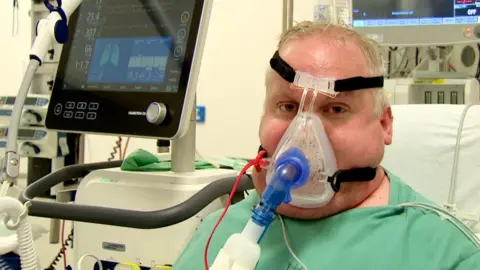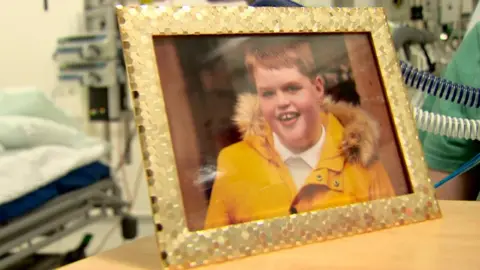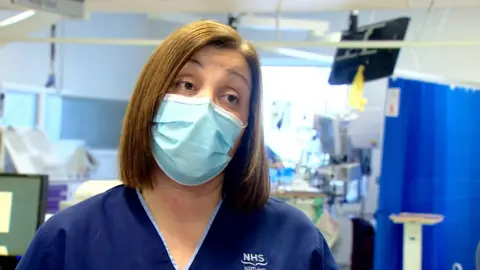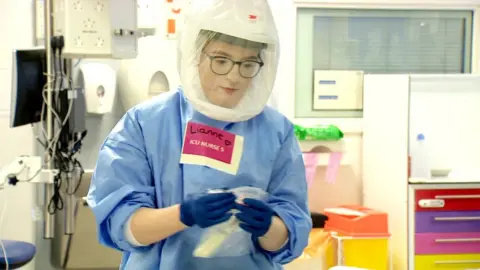Covid in Scotland: 'Shocking' to see more people in 30s in ICU
 BBC
BBCAt the age of 35, Richard Linning, from Falkirk, has found himself fighting for every breath.
Now wearing a high-pressure oxygen mask, he says he is in a state of shock after testing positive for Covid-19 and being admitted to Forth Valley Royal Hospital.
"At the beginning of last week I was perfectly fine and then I got a really sore headache," he says. "For three days I was in pure agony.
"And then I started struggling to breathe and that's when it started to deteriorate."
A portrait of his 10-year-old son Blair sits beside him in the Covid-19 intensive care bay at the hospital, where he has been since Saturday.

Richard is a bus driver working out of First Bus's Larbert depot, where eight members of staff tested positive last week.
"I don't know how I've picked this up. My work has been really careful in making sure that we've all been safe and I've always followed the rules from day one," he says.
"It just shows you how transmissible this virus is."
'All ages contract Covid'
Older people are more at risk of developing severe disease or dying from coronavirus. But Heather Riddoch, the senior charge nurse here, says they have seen a different profile among some patients in the second wave.
"We're certainly seeing younger patients that are coming in and requiring ventilatory support," she says.
"All ages contract Covid, but we are seeing more people ending up in intensive care in their 30s and 40s in this second wave."

"I think it's more shocking to see younger people coming in. We've got patients in who are close to our age and younger.
"A lot of young nurses here are seeing patients who are the same age as their parents, and more families in the ward all at the one time as well.
"There's a definite shift there and it's shocking and it's more real because it could be you."
This means the increased protection of vaccination for the over-70s won't immediately relieve all the pressure on the NHS.
Patients doubled in 48 hours
Numbers in hospital and ICU are gradually falling across the country, and are now back below the peak seen in April.
But that's not the case everywhere, and here in Forth Valley Royal, clinicians are worried they're starting to see the worst of this wave.
Heather says that earlier in the week things had started to get quieter.
"We really felt things had taken a good turn. However, in the last 48 hours we have doubled the number of patients admitted with Covid and it's been quite shocking at how quickly that rapid turnover has happened.
"We have actually had to open up another ward and it's a massive change from the beginning of the week."
Dr Fiona McIlveney, who is the clinical lead for intensive care, says the hospital may be feeling the impact of recent outbreaks in Falkirk and Clackmannanshire, which have put local infection rates among the highest in Scotland.
"I think we are probably a bit different from the rest of the country in that we are still seeing a rise in our Covid numbers in the hospital and in intensive care, she says.
"I think there is always going to be regional variation. It's not entirely clear why, but for us we are just starting to see this peak of activity now and this will be our focus for the next few weeks.
"Staff have done a phenomenal job for almost a year now. They've had to run their own lives outside of here, they've had the same challenges about home schooling, and worries about illness and family concerns, but every day they've squared their shoulders and come in here, and they have given their absolute all.
"I'm so proud of the way they have delivered excellent compassion and care to patients and their families."

Unlike some other health boards, at Forth Valley Royal they have managed to continue with much of their scheduled non-coronavirus care.
Just next door to the 10-bed Covid ICU, there's another unit where staff are caring for patients with heart problems, kidney failure, and the aftermath of drug overdoses.
They also look after patients who were previously in the Covid ward, but have now tested negative.
'Some will never be the same again'
The Scottish government recognises that many patients are spending longer periods of time in intensive care. The most recent figures showed 28 coronavirus patients had been in ICU for longer than 28 days.
Dr McIlveney says the effects of long stays don't stop when patients leave the doors of the unit.
"I think our surviving patients can spend up to 60 or 70 days in here before they leave intensive care, and then that leads them still to a long period of rehabilitation," she says.
"The effects of that persist for some time and some people will never be the same again."
Richard warns that some people still need to realise how serious the disease can be for younger adults.
"I mean this hand on heart, on my wee boy's life, you really need to wake up and take this seriously," he says. "This is no joke, I wouldn't be wearing this mask for publicity. This is genuine, this is real."


Do you have a question about the Covid restrictions in place in Scotland? Use the form below to send us your questions and we could be in touch.
In some cases your question will be published, displaying your name, age and location as you provide it, unless you state otherwise. Your contact details will never be published. Please ensure you have read the terms and conditions.
If you are reading this page on the BBC News app, you will need to visit the mobile version of the BBC website to submit your question on this topic.


